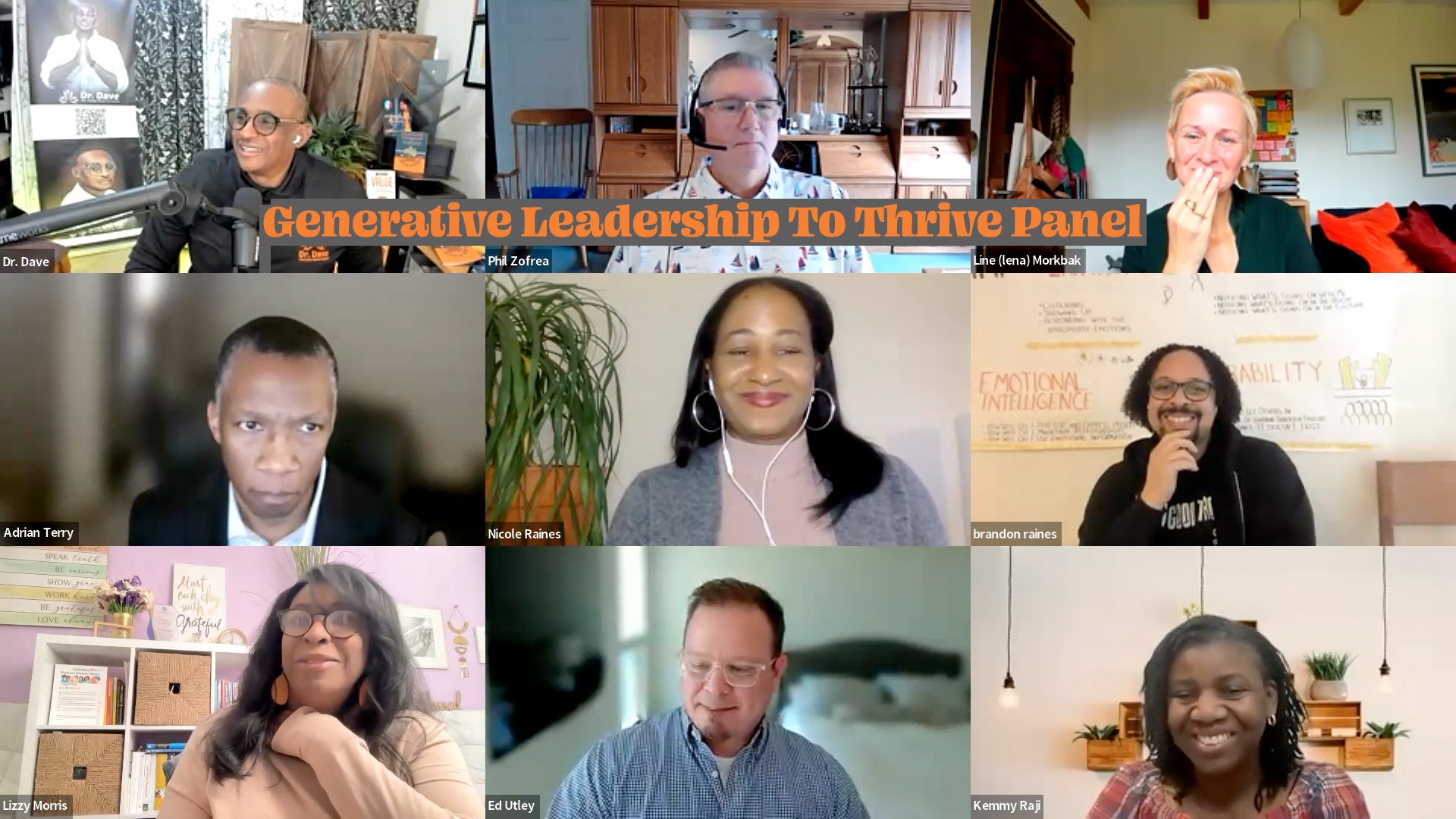E119: Generative Leadership To Thrive Q&A Event

Nine Leaders Discuss Generative Leadership To Thrive
Summary
- Leadership, Scrum, and generative leadership. 0:02
- Dr. Dave encourages gratitude, kindness, and safety in panel discussions.
- Nicole Rains, a licensed Marriage and Family Therapist, joins the panel to discuss fun and joy in the workplace.
- Lena, an enthusiast, shares insights on expanding collaboration in a remote and hybrid work environment.
- Dr. Dave shares their leadership journey, from scholar to practitioner, focusing on generative leadership.
- Generative Leadership in a Complex World. 6:59
- Dr. Dave defines generative leadership as a human-centered practice that creates conditions for teams to thrive.
- Industry leaders like Peter Sands, Margaret Whitley, Ron Westrum, and Satya Nadella emphasize themes of self-organization, emergence, and co-creation in their discussions of generative leadership.
- Dr. Dave highlights the importance of generative leadership, rooted in Ubuntu’s philosophy of "I see you, I value you, I welcome you," and emphasizes the need for patience, kindness, and safety in leadership practices.
- Dr. Dave discusses the shift in leadership styles, moving away from authoritarianism and great man theory and towards more human-centered approaches prioritizing belonging, resilience, and partnership.
- Dr. Dave discusses the importance of generative leadership in today's organizations, citing the need for adaptive strategies and flexible operations.
- Adrian shares a pivotal moment where he witnessed the transformative power of an abundant mindset in creating a culture of generosity, collaboration, and innovation.
- Leadership, relationships, and empowerment. 14:52
- Adrian shares a pivotal moment when a leader prioritized psychological safety and sought out dissenting voices in a senior leadership meeting.
- Adrian encourages the team to repair individual relationships to improve communication and psychological safety.
- Leadership, language, and team resilience. 18:56
- Line emphasizes the importance of using "we" language in leadership to create a psychologically safe environment.
- Dr. Dave empowers the team to embrace the generative, adaptive practice of winning and losing as a team, shaping an approach to team resilience and growth-oriented feedback.
- Leadership, trust, and empowerment in a work environment. 22:47
- Kemmy highlights the importance of understanding an individual's vision, goals, and aspirations when working on a project.
- Leaders should balance expectations and navigate pressure from various stakeholders, including the government, to achieve a common goal.
- Leaders prioritized team feedback and autonomy to drive project success.
- Leadership, trust, and collaboration in a new role. 27:23
- Phil highlights the importance of communication and trust-building in a new leadership role.
- With vulnerability and open communication, Phil uses a competency matrix to evaluate and assign roles based on skill levels.
- Phil shared a story about empowering his team by trusting them to get work done and collaborating with QA, resulting in increased innovation and productivity.
- Brandon Reins, a pitmaster, discussed the importance of cultivating meaningful partnerships and relationships in leadership, citing examples from his experience.
- Teamwork, leadership, and experimentation in software development. 33:00
- After working with teams and seeing the impact of unhealthy relationships on productivity and clarity, Brandon realized the importance of relationships in teamwork.
- Brandon had a eureka moment when he read the Agile manifesto and realized the importance of prioritizing individuals and interactions in teamwork.
- Brandon highlights the importance of having a supportive team, saying it makes the day much better when stuff sucks (35:38)
- Lina will discuss experimentation in teams and leadership mindset, sharing successes and failures (37:03)
- Hybrid work experimentation and learning from failures. 38:09
- Line discusses the importance of experimentation in building teamwork and collaboration.
- Organizations struggle with a hybrid work model after the pandemic and seek help from a consultant.
- Experimentation is key to understanding hybrid work, with teams exploring different in-person and asynchronous collaboration methods to find what works best for them.
- Learning from failure is crucial for growth in the hybrid work context, with leaders emphasizing the importance of embracing setbacks and using them as opportunities for growth.
- Leadership, trust, and empowerment in a software development team. 44:31
- Ed, a former automotive engineer, was introduced to Agile and Scrum by a friend who was a CIO, and he found it to be effective in changing the mindset of employees in a previous company.
- Ed joined a new company as a Scrum Master Agile coach, where he witnessed a generative leader who believed in the methodology and had data to prove its effectiveness, leading to positive changes in the company.
- Ed shared his experience of working with a leader who empowered him and encouraged him to take risks, leading to a more innovative and collaborative work environment.
- Nicole Raines was mentioned as someone who embodies fun and joy in the workplace, and Ed highlighted the importance of these qualities in a positive work environment.
- Creating a work environment that fosters joy and fun. 50:12
- Nicole shared their experience of creating a joyful work environment by allowing employees to showcase their strengths and interests through committee work, such as teaching cooking lessons or dance classes.
- The "I Just Want to Say" box allowed employees to share their thoughts and feelings throughout the workday, fostering a more connected and engaging work environment.
- Nicole shares a personal example of creating joy in a dark space by collaborating with a child with complex trauma using a flower garden model.
- The speaker emphasizes the importance of listening to clients and staff to create an environment where fun and joy can exist.
- Leadership practices and their implementation. 54:53
- Dr. Dave outlines a generative leadership model, including tenets and practices.
- Adrian reflects on the progression of "head, heart, hands, and habits" in organizational development, highlighting the interconnectedness of these areas.
- Shifting mindset for business success. 59:05
- Ed emphasizes the importance of adopting an abundance mindset in leadership, which shifts how one views people, business, and competition and fulfills the generative Adaptive Practice.
- Line and Lizzy agree, highlighting the significance of recognizing that corporations are made up of people who work together to achieve success rather than individuals striving to reach the top alone.
- Ed emphasizes the importance of adopting an abundant mindset in business, where customers are waiting for the right message and product.
- Ed believes that by focusing on the "within" of an organization, such as its culture and values, organizations can create a more cohesive and successful "without" or external environment.
- Leveraging Generative Leadership in Business and Beyond. 1:04:11
- Lizzy suggests co-creation and adaptive leadership to navigate organizational fog during uncertainty.
- Organizations can create powerful strategies by involving more than just the top leadership in decision-making and using techniques like OKRs to align and reflect on progress.
- Engineers are closest to the product and can provide valuable insights for generative leadership.
- Empowering generations in the workplace. 1:10:08
- Lizzy suggests empowering people through education and skills training to create positive change in their communities.
- Lizzy dreams of a world where local councils prioritize education for all children, regardless of gender or previous lack of access.
- Dr. Dave and Lizzy discuss the importance of self-organization in the workplace, particularly for the next generation of workers asking different questions about their work and seeking more autonomy.
- They suggest incorporating self-organization techniques into education systems to empower young people to set agendas and guide conversations rather than relying on top-down approaches.
- Dr. Dave emphasizes the importance of generative leadership to harmonize the different generations in the workplace and community.
- Nicole shares their experience of challenging traditional law firm culture and prioritizing well-being, demonstrating that even in traditionally demanding fields, intentional habits and dreams make change possible.
- Diversity, harmony, and collaboration in the workplace. 1:17:47
- Brandon and Speaker 9 discuss the concept of diverse voices and perspectives in the workplace and how it can lead to stronger decision-making and problem-solving.
- Lizzy emphasizes the importance of collaboration and bringing people together to create a better tomorrow.
- Music is highlighted as a universal language that can bring people together across cultures and dimensions, and making music is encouraged as a way to unite and create a harmonious world.
- Generative leadership and adaptive practices. 1:22:41
- Dr. Dave thanks attendees and panelists for sharing insights and launching the cohort in February with generative adaptive practices.
#GenerativeLeadership #GenerativeLeadershipToThrive #GLTT #GenerativeAdaptivePractice
Watch the Video
Podcast (ks_dd): Play in new window | Download (Duration: 1:28:01 — 120.9MB) | Embed
Subscribe: Apple Podcasts | RSS
